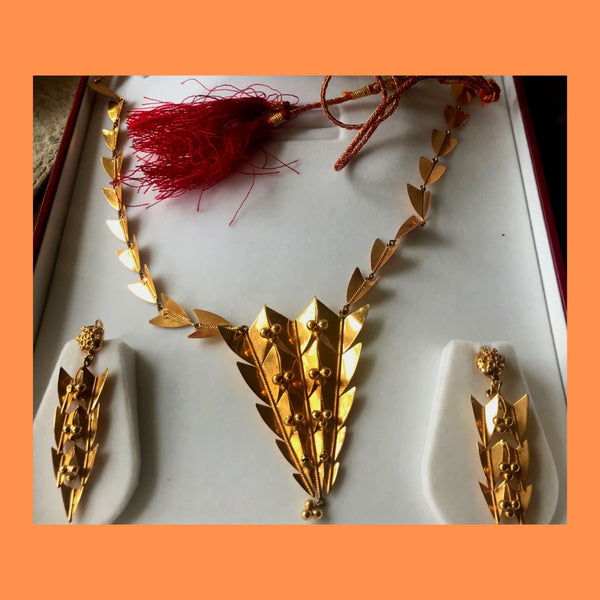In Episode 6, I speak to Sofia about "arranged marriage", dowry and how the loving sentiment of the pieces gifted to her from her parents and grandparents for her wedding still stands proud despite the marriage not working out. We talk about her mother's journey to the UK to meet her father who was part of the Merchant Navy, for the first time, and how he actually bought her mum, her wedding set that was especially designed and handcrafted for her as her family couldn't afford to buy her the set at the time.
She talks about her mum travelling to the UK for the first time.
"And then she travelled to the UK in 1965 at the tender age of 18 on her own, with no coat, in a silk suit, got off the aeroplane got pneumonia, spent her first three weeks in the UK, in hospital with pneumonia. Plus I can't even imagine what that must have been like."

As the episode unravels, you can really hear Sofia's journey of enquiry to find out more about her own family's history, and since this first meeting on zoom, we have met in person and I could really feel the warmth from her. She even had her mum's wedding set on, and subsequently found a matching statement cuff that she showed me when we met at the Empowered Adornment event at Derby Musuems in early August of 2021.
"Okay, so I do remember from a very early age, having access to my mom's jewellery. It was never locked away it wasn't this safe. And I remember playing with my mum's wedding set. My mum wasn't a big lover of jewellery, she doesn't own didn't own very much. My dad used to like to buy jewellery for her, and I remember her saying; You know we could have bought a new car!
When my mum & dad wanted to start buying me a few pieces as I was getting older and they were thinking about my marriage and adding to my dowry or my trousseau. I remember being very anti, all of that, I didn't want it. What I really wanted was a car! I remember my dad saying to me,' you can't wear a car'. I remember it really well."


Sofia went on to tell me about her 'arranged marriage' and how her relationship with jewellery began.
"I went to Pakistan when I was 17 and went to buy jewellery, having this jewellery bought for me, put me on a path really, I knew I was going to have an arranged marriage and arranged in the loosest term. So my dad was friends with a very influential immigrant family in Coventry, it was a really nice guy actually, they introduced us to a family in Nottingham. My mum said, just look at him, and he's going to look at you, so he walked through, really handsome chap.
And the next thing I knew they were visiting, and I was making tea, bringing the tray, making sure the tea is served properly being quite modestly dressed, you know, I had absolutely no intentions whatsoever, but I kind of went through the motions! Well, turns out that he was really nice and I really liked him."

She then tells me about when the marriage broke down and how she feels about the jewellery looking back at her experiences;
"I think my parents felt very guilty for the ending of my arranged marriage and it wasn't their fault. It wasn't really, you know, and there was, there was no intention of keeping those promises on their side but I mean I don't need to get into it, it's put me where I am today so I don't regret it. But I have this amazing collection of jewellery that came from that. My jewellery has a lot of memory attached to it but I don't associate the bad memories about arranged marriage with this jewellery I associate this jewellery with my parents and with my grandparents, and, you know, the fact that they sacrificed a lot to ensure that I have this"

She then goes on to tell me about the sentiment of her Dad buying jewellery for her mum, she now sees in her partner today who lovingly buys her carefully chosen pieces as a gift of love and care.
"It's interesting isn't it because my husband now likes to buy jewellery. For me, I think he probably thinks the same as my dad and as my grandfather said it's an investment, and it's an investment for when things go bad"

I really appreciated the honesty and openness in which Sofia shared her life experiences with me through out this episode, sharing how the jewellery pieces bought for her were key markers in the journey she's been on thus far. What was also really interesting was how her story shone a light on the role of a male in buying these jewellery pieces from her mum's wedding set bought by her father to the pieces her partner buys for her today.
Sofia's story shows that it's up to the wearer of these pieces to attach memories that resonate with them to the jewellery- in her case she has chosen to associate her dowry with happy memories of her loved ones.
Foot note on Dowry: Dowry: a transfer at marriage from parents to daughters and in-laws, and an ancient tradition thought to date back to at least 200BC in medieval western Europe. Although now illegal in India, the concept still lives on and families in India often start saving for the dowry as soon as a girl is born. A 2018 study showed the heartbreaking links between gold prices and the survival rates of baby girls in India—when the global gold price goes up, it is more likely that girls will be aborted or die in the first month of life.
The concept of a dowry is mostly redundant within the South Asian diaspora in the UK. The transference of gifts from the bride’s parents is mostly to the bride herself, as her own financial security and even more common as financial help when buying a home. Until the mid-20th century, the only form of stri-dhana (stri meaning woman and dhana meaning money/property) according to Hindu sastric law was the female’s right to gold, often gifted to her by her parents during her wedding. Patriarchal biases in these laws meant, and often still mean based on interpretation, that an Indian woman’s right to property and financial assets was often limited, thereby placing immense importance on the accumulation of her assets in the form of gold jewellery. Traditionally, gold jewellery pieces were given to the daughter as security if for any reason she had to flee the marital home, as well as the gifts given to in-laws for ‘looking after’ her. This may explain why in my own family there has been such huge importance placed on being financially independent especially as a South Asian woman. Our female ancestors relied so much on their male counterparts (father, brother, husband) that when we, as the first generation who had a chance to study at university, chose career paths, there was a huge premium placed on being financially stable.















